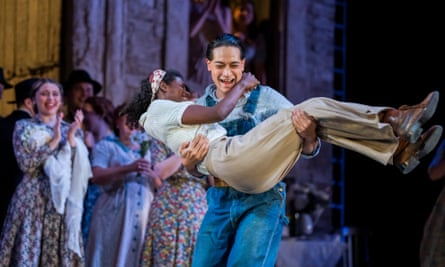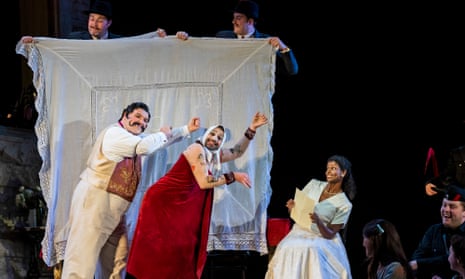One of the many consequences of the cuts imposed by Arts Council England on England’s opera companies was the cancellation of Glyndebourne’s autumn tour. Substantial parts of the country now have no opportunity either to experience opera at all, or to participate in the educational and community projects that surround it. The autumn season at Glyndebourne itself remains in place, however, albeit somewhat reduced, and opens with a revival of Annabel Arden’s 2007 production of Donizetti’s L’Elisir d’Amore.
The first night was not without incident, as tenor Filipe Manu (playing Nemorino) began to feel unwell during the performance, and at the interval it was announced that his understudy, Rhys Batt (who was in the audience), would sing the remainder of the role from the side of the stage while Manu acted. Apart from a couple of tentative and underpowered high notes, Manu had actually given little indication of indisposition, and indeed sang the first act with his customary elegance and grace. Batt, with his darker, weightier voice, understandably took time to settle in to his duet with Theodore Platt’s Belcore, but his finely introspective Una Furtiva Lagrima brought the house down. On stage, Manu, very much the theatrical animal, was gauchely naive and touchingly sincere throughout.

As Adina, Mariam Battistelli gave us a subtle portrait of a spirited woman whose understanding of the emotions of others is not always matched by comparable awareness of her own, sung with fire in her tone and a lovely sense of line. Platt, with a wicked glint in his eyes and suavity in his singing, was terrific as the arrogant (if by no means always successful) womaniser Belcore. Tiziano Bracci’s roguish Dulcamara sounded lighter and brighter-voiced than some, but his way with words is second to none and he was wonderfully funny throughout. Ffion Edwards did much with little as Gianetta (a role often undercast – not so here), while the chorus threw themselves into it with great glee. And there was fine conducting, at once witty and tender, from Adam Hickox.
Arden’s staging, meanwhile, updating the work to the 1950s, has great charm as well as considerable insight. Giving Dulcamara a silent, sexually ambivalent male Assistant (circus performer Maxime Nourissat) allows her to suggest levels of irony in the opera that some directors have ignored. The production’s real brilliance, though, lies in its refusal to caricature Donizetti’s protagonists and its humanity in the way it offsets gentle humour with moments of deep sadness.
It’s a lovely evening, in fact, so it’s a great shame that due to the necessity to cancel the tour, many will now be unable to see it who might have done so.

Comments (…)
Sign in or create your Guardian account to join the discussion